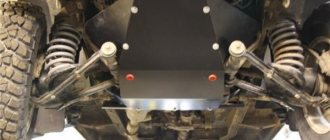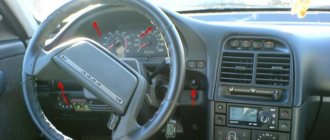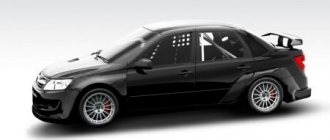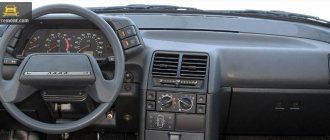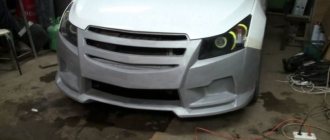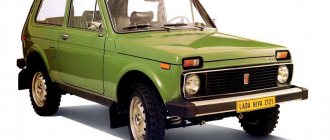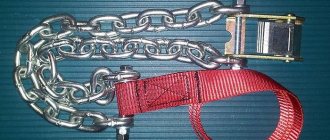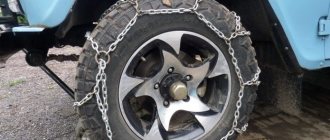April 5, 1977 has firmly entered the history of the domestic automotive industry, since it was this date that launched the mass production of the popular Soviet SUV VAZ 2121. Reasonable price and ease of maintenance, coupled with the high cross-country ability of the vehicle (which many modern models still achieve today) and today keeps this car brand at the top of the car sales list.
Of course, it also has some technical shortcomings and some flaws. But who said they can't be improved? Moreover, tuning a VAZ Niva with your own hands will not require an injection of colossal financial resources, and will not take much time.
The most important argument in favor of improving the car is its age (after all, 40 years is a long time and a lot of water has flown under the bridge since then).
In addition, what was comfortable for a Soviet person is not entirely suitable for a person of modern times. This is especially felt during a long trip.
Not very good smoothness and clarity of steering, technical shortcomings of the engine, not very comfortable internal content - all this can be adequately improved with the help of other parts.
The updated Niva will receive new technical and aesthetic characteristics, which will immediately affect the comfort of movement in this car. It is in this direction that you should do tuning a Niva 4 x 4 with your own hands.
What to change
Do-it-yourself tuning of a Chevrolet Niva (and older models too) should begin by identifying the most important priorities. That is, it is necessary to determine what needs to be replaced first, and what can wait a little.
In general, modification of the machine may include such fundamental changes as:
- Complete replacement of lighting fixtures;
- Replacing conventional wheels with models with a larger diameter in order to be able to travel on domestic off-road conditions;
- Complete rework of the interior trim (replacement of the dashboard, steering wheel, trim, etc.);
- Improving the suspension by adding new automotive elements;
- Installation of arch extensions. This function will help overcome several problems at once - the doors and fenders will not get too dirty, plus the tuning composition will become noticeably wider;
- Taking engine power to a whole new level;
- Adding more efficiency to the trunk.
Based on these key changes, you can build a competent strategy for pumping up your car.
Many improvements can be done yourself; some more complex ones can be left to an experienced professional. And it will not be superfluous to search for information that could be useful in this work.
Small but significant changes
The Niva's bumper is most often in good condition, but I still want to transform it. To form new parts, glue them to the base and cover them with paint, you will need fiberglass. It gives the car style and originality, and lasts a long time.
For changes in Niva, set:
- New modern thresholds, especially if they are completely out of order, have begun to rot.
- Radiator grilles to ensure high-quality air flow. In addition, the design of the new grilles has changed significantly, and new technologies have improved quality.
In principle, the owner of the Niva can reinstall them himself, but if original painting or airbrushing is planned in the future, then it is better to entrust the replacement of parts to a specialist, since the design may be deformed.
Improving the “heart” of the machine
Do-it-yourself Niva engine tuning should first begin with improving the characteristics of the carburetor.
The most correct and productive solution is to install a more modern model, which has a larger diffuser (or as it is also called a throttle).
When replacing this unit completely, the best option would be to install an electronic ignition system. It is both more convenient and more modern.
Replacing an old carburetor with a new one won't look as productive unless you also replace the camshaft. This is a very important point, since it is this combination that can give the car more power, and therefore more speed.
Of course, this will lead to strong heating of the parts, but this is not a problem either. A new radiator with a larger surface area and the problem is solved.
Correcting the engine geometry looks like an interesting approach. Indeed, on Niva it is quite voluminous. To perform this operation, it is necessary to increase the diameters of the valves.
Suspension. Can't it be radically improved?
The VAZ-2121 suspension was quite revolutionary for the seventies - before the Niva, such technical solutions were not used in off-road vehicles.
The front suspension is independent, on wishbones, equipped with springs working in pairs and hydraulic shock absorbers. The design includes a stability stabilizer.
The rear suspension is dependent, with mounting to the rear axle beam and a Panhard rod. The suspension is provided by hydraulic shock absorbers and springs similar to those used in the front suspension.
The simplest and very justified step for those wishing to tune the Niva 2121 is to replace sets of springs and shock absorbers. The latest devices are now gas-filled, they are more reliable and handle irregularities better.
You can also recommend strengthening the shaft supports and the front and rear axles by installing special steel inserts - boxes, as well as increasing the ground clearance by using special inserts between the suspension elements.
All these measures will somewhat reduce the discomfort of driving on a bad road, slightly improve the ride and off-road qualities of the car, but they will not be able to radically change anything.
If you need really serious changes, you should think about replacing the rear suspension of the outdated Panhard system with a more modern independent design. This will not only improve the smoothness of the ride, but also significantly improve the vehicle's handling characteristics, especially on hard road surfaces. The most suitable option is to install suspension kits from imported cars of similar class. However, such an operation requires both considerable financial costs and a large amount of work, including quite complex welding work to install a new beam instead of the standard one.
New interior design
What is important in tuning the Niva’s interior with your own hands? That's right - this is installing sound insulation. To do this, you should buy special material (luckily you won’t have to search for a long time) and carefully cut the shape to the size of the bottom.
Such know-how will make it impossible to listen to the car’s camshaft, which loves to “sing” loudly while driving on the asphalt.Replacing the decor inside the car should start with standard things. Of course, the door and seat trim should be reviewed first.
To do this, you can travel to shops and markets to choose the best option. In a more radical case, the old seats can be replaced with more modern types of seats (for example, a sports type).
You can, of course, upgrade the old version, but it will be more expensive financially and will take quite a long time.
Reupholstering the interior is also an important point. Here you can either use what you have at home or purchase a special kit. The interior of the car, made in light shades, looks very cool.
And finally, you can replace the steering wheel. In addition, now you can find any model, even a Ferrari.
Mirrors and glass
Replacing standard mirrors is not only a desire to improve the appearance of the car, but also to increase traffic safety by increasing visibility. For greater comfort, electrically adjustable mirrors are installed. This allows you to adjust them if necessary, even while driving. Mirrors of various shapes can become a distinctive feature of the car and emphasize its individuality.
https://www.youtube.com/watch?v=xkRMAqottr0
You can enhance the tuning effect by using side and rear windows. Various tinting, especially with a spray effect or mirror, will best complement the appearance of the SUV.
Read news about the new Niva
- The modernized Lada Niva Legend (4x4) 2021 was shown on the Internet
- Lada 4×4 Bronto - sales stopped, new details » Lada.Online - all the most interesting and useful about LADA cars
- Description of the instrument panel Lada 4×4 (VAZ 2121, 2131) » Lada.Online - all the most interesting and useful about LADA cars
- Chevrolet Niva gasoline consumption per 100 km
- Buy LADA (VAZ) 2131 (4×4) 2022 in Rostov-on-Don, low price for Lada 2131 (4×4) 2022 on the Avto.ru website
- Fuses Niva 21214 injector «
- The new large Lada 4×4 Niva “Bigster” 2021-2022 based on the Dacia Bigster was shown for the first time. The SUV has changed beyond recognition
- New Niva Chevrolet Lux 2022 - review of GLC equipment
Trunk upgrade
Tuning the Niva trunk with your own hands is also necessary. Despite the fact that the factory version of the trunk is quite spacious, the quality of workmanship is not entirely good.
This unpleasant moment occurred due to the fact that the trunk structure consists of a transverse rib and a folding shelf, which divide the opening in the car in half.
To overcome such a defect, it is best to make a special box and install it in the trunk. In addition to it, it will be possible to equip the trunk with:
- LED elements (bottom and top);
- A powerful subwoofer and a good music system (but this is only if the owner is a music lover, since such an installation reduces trunk space).
In the future, it will be possible to think about the placement of the organizer, because the luggage compartment is quite large, so no problems are foreseen.
All-terrain vehicle based on the Niva "Bronto"-1922, modified for hunting and fishing - review
Many people are familiar with the saying: “And what the Russians won’t come up with, as long as they don’t build good roads.” Indeed, the cross-country ability of the Bronto-1922 Marsh all-terrain vehicle is impressive. However, with the right approach, it is possible to get an even more suitable vehicle for complete off-road use from this car.
It all started with the fact that in 1997, avid hunters Andrei Sirotin and Alexander Lykov purchased a Marsh all-terrain vehicle. It was at this time that the Tolyatti company began to manufacture these all-terrain vehicles to order. Essentially, the car is a body from Niva-21213, installed on a thoroughly modernized chassis from UAZ, equipped with wheels with ultra-low pressure tires. As a result, huge fender flares appeared on the body. The engine, gearbox and transfer case are from a VAZ SUV.
Without the golden hands of welder Anatoly Chernikov, this machine would hardly have happened
In an all-terrain vehicle, Andrei and Alexander drove through impassable swamps in search of hunting trophies, crossed virgin snow of any depth, and even swam across small water obstacles. The beast was a car in terms of cross-country ability, but not everything about it suited it.
The chunky interior of the Niva cannot be considered a good option for transporting several people loaded with equipment, and in winter, in addition, in warm clothes. The high-speed VAZ engine turned out to be rather weak for turning wheels with a diameter of more than a meter. Transmission units from Niva sometimes could not withstand increased loads. During seven years of active operation, three (!) transfer cases had to be replaced. The brakes and the operation of the power steering were also criticized. The front plastic (!) bumper has become completely unusable. The seats in the cabin, as Andrey aptly put it, turned to dust. In the end, a radical decision was made: to completely disassemble the car and remake it in accordance with its needs, simultaneously increasing its reliability. The work took a year and a half.
Note the original hood. It contains elements from Niva and Ural
A more powerful and high-torque UMZ-4218 engine was installed. The gearbox and transfer case were replaced with UAZ ones, considering that large gears and shafts were better suited for an all-terrain vehicle than similar miniature parts from a passenger SUV.
The "Marsh" initially had modernized drive axles from UAZ. The changes consist in the fact that the stockings on the “civilian” bridges were lengthened, on which the final drives from the portal bridges were “hung”. The overall gear ratio of such a unit turned out to be quite significant, which is what is required to turn the huge wheels. The new transfer case (as we remember, it was taken from the UAZ) was not in the place where the Nivov unit was. Accordingly, the cardan shaft for driving the front axle was not connected to its main gear. Therefore, the gearbox had to be moved to the right edge, which, of course, required altering the axle stockings and axle shafts. This important and labor-intensive operation was carried out not on the knees in the garage, but at a machine-building plant.
Under the hood, everything is different from the Niva
The rear axle remained almost unchanged. They just welded cups to it for the suspension springs. Now it has turned out to be combined: standard seven-leaf springs from the UAZ are side by side with slightly shortened springs from the classic Zhiguli. This was done to prevent the car from settling to the stern, because the weight of the rear part of the body has increased significantly. IRONMAN shock absorbers were installed all around.
Rear combined spring-spring suspension
Disc brakes were installed in front. This kind of tuning is familiar to many UAZ owners on “military” bridges. Now it is possible to keep the car on a steep slope after driving onto it from the water. Previously, this was not always possible.
The UAZ engine barely fit under the hood, but there was absolutely no room left for the radiator of the cooling system. I had to lengthen the car’s “face”. The parts of the tail of the Ural army truck were used. The hood was very carefully welded from Nivovsky and Uralovsky. The engine became more spacious, and it became possible to use a radiator from a Volga car. It is larger than the VAZ one, and the engine no longer overheats when the all-terrain vehicle moves in difficult conditions. Previously, this happened with enviable regularity. For greater reliability, two electric fans were installed in front of the radiator, leaving a constantly rotating fan on the pump shaft. Additional airflow is activated both by a temperature sensor in the cooling system and by force using a toggle switch on the dashboard. In severe frost, blinds controlled from the cabin can be useful.
Now water won't get through the bridges
A Berkut compressor was placed under the hood, the main purpose of which was to pump up the huge “Trackol” wheels. Maximum pressure 0.4 atm. is achieved after approximately 7 minutes of compressor operation. But it takes much longer to bleed air from the tire through the nipple of a standard-section nipple, so... water ball valves were welded into the wheel rims (the tires are tubeless). Now, by turning the flag, you can very quickly release the air from the large wheel, which is convenient. The outside of the wheel rims are covered with round aluminum flaps, so snow or dirt will no longer clog their internal cavities. Previously, this happened quite often, as a result, finding the nipple was not at all easy.
A snorkel is not needed for such a machine, since it physically cannot go deep enough into the water for the engine to take a fatal sip. Yes, thanks to its huge wheels, the March is capable of floating, but this should not be abused. Andrei Sirotin learned from his own experience that after prolonged water procedures, water will rise in the transmission units. The breathers of the bridges, gearboxes and steering gears were nevertheless brought into the engine compartment, as was done on the standard version, but the owners are not going to go on serious voyages in the all-terrain vehicle. The steering knuckles of the front axle were carefully polished by hand so that the marks and shells on them did not retain dirt and thereby spoil the seals.
The crane allows you to quickly lower a huge wheel
As I already mentioned, one of the reasons why the March was modernized was the cramped and uncomfortable interior of the Niva. The only thing I liked about him. — These are wide front doors. Therefore, the front part of the cabin was left practically unchanged, which cannot be said about its rear part. Here it is appropriate to mention the name of the welder Anatoly Chernikov, without whose golden hands the machine would hardly have been made. Of course, Andrei Sirotin had other assistants, but the format of a magazine article does not allow me to mention them all.
UMZ-4218 engine, Berkut compressor and a hose with a pressure gauge for measuring air pressure in tires. Accurate, medical pressure gauge.
So, immediately behind the front seats, a spacious rectangular-shaped passenger and luggage compartment begins. In order for such a modified body to fit on the frame, it had to be lengthened by 40 cm, but the base of the car remained the same (2,685 mm). The body frame was welded from a thin-walled, and therefore lightweight, square section profile. The outside was sheathed with steel sheets 0.8 mm thick. They put insulation and covered it inside the cabin with sheets of aluminum and plywood. Moreover, the aluminum joints on the floor and along the walls are sealed, so the interior can be washed with water pressure from a hose.
Reliable protection of steering rods
Glass was installed on the sides, which were used in the folding trunk door of a UAZ hardtop. We chose a model with heating, so you don’t have to worry about the windows fogging up. Glass from the “loaf” was inserted into the rear swing door. But perhaps the most interesting point is the sliding windows of the front walls of the “living room on wheels”. Upon closer inspection, it is not difficult to guess that the upper parts of the doors of a ZIL-130 truck are used here. You turn the handle inside the cabin and the window goes down. In summer, you can improve ventilation by opening narrow and high windows. But sliding windows are needed not so much for comfort and cool driving, as I naively thought at first, but for hunting. The window openings serve as a kind of loopholes. Everything in this car is subordinated to one goal - to make a convenient vehicle for hunting. This manifests itself even in small things. For example, branch breaker cables. going from the “kenguryatnik” to the roof, they are stretched in such a way that they do not fall into the firing sector from the front windows - loopholes.
view from the loophole
Of course, a hunting vehicle cannot be without a sunroof - it is also present here. It is important that all glass is used from commercially produced machines. If any of them breaks, you can purchase it from a store and replace it.
The “exhibits” on the rear wall of the body can and should be used
All seats were made specifically for this car. Moreover, they were made for specific people who would ride it. For example, the right front seat is lower than the driver’s seat - it is intended for the tall Alexander Lykov.
The salon is not afraid of dirt. The front seats vary in height and are tailored to specific people
On the back wall of the cabin, attention is drawn to the equipment, without which it is scary to go into the forest. There is a high-jack, a shovel, an ax, and a strong rope. In the front of the car, behind a powerful bumper made of a metal pipe. A Warn 9000 electric winch is mounted on a special platform. Although in practice it will most likely be needed infrequently, because “getting on” with such an all-terrain vehicle is quite difficult. But this possibility cannot be completely ruled out: the weak point of this car is the lack of good lugs on the tires.
I suggested that even a good VAZ stove would not be able to warm up such a large interior. But an autonomous heater is not provided. The owner of the car thought that this was unnecessary: they say, in winter you always go hunting dressed warmly - you won’t freeze. But running the engine all the time to make it comfortable in the cabin is. It seems to me that this is not very rational. By the way, a small note about idling. I agree with Andrey that it is not very pleasant to sort out hunting trophies or butcher a carcass next to a running machine, since instead of clean forest air you have to breathe exhaust fumes. Therefore, the muffler pipe was extended and ran up the rear wall of the body. Now the exhaust goes into the sky and does not poison the air below, next to the car.
The dashboard from UAZ is clearly in place here
Instead of the Nivovskaya one, a metal dashboard from UAZ, which is more practical for an all-terrain vehicle, was used. It contains standard instrumentation, but there is no speedometer at all, since it is not needed. In its place is a display of a stationary radio station, and a PTT (microphone) hangs nearby. The most important fuses are also located here, mainly responsible for the operation of lighting devices. If necessary, you can quickly find a burnt-out fuse link and promptly replace it.
With so many headlights, it’s not scary to go into the forest at night
The handle of the finder headlamp sticks out of the roof overhead. Undoubtedly, this is a convenient and necessary thing in the forest, and four headlights located at the top serve to illuminate the path. In an open field, in a swamp or in a forest, turn indicators, to put it mildly, are not very necessary. Good light is much more important, so small rectangular halogen headlights have appeared in place of the front indicators. The side turn signals remain, and a full set of signal lights is available at the rear. Reversing in the dark will be made easier by a small but bright headlight mounted on the wall of the body.
It is amazing how carefully all the work was done. First of all, of course, you pay attention to the appearance. Often a car of this class will be painted somehow in the garage, I think. that in the forest there is no one to show off to. But in this case, the body was puttied, primed and painted in a specialized workshop. Looking at the hood, it’s hard to believe that it is welded from three parts - .1SN. Other elements of the body also look neat and branded. The interior decoration is also of high quality, although it is simple.
Now, when you read our magazine, the all-terrain vehicle may be making its way through the thickets. a clearing or crosses a marshy swamp. Satisfied people with pits and bandoliers are sitting in the cockpit. They need to drive to the designated place, where a successful hunt awaits them. And they will get to their goal, because this car simply has no use for roads.
Video
Photo of do-it-yourself Niva tuning
Body reinforcement
Modification of the body part is necessary to additionally protect the main elements from external influences. An anti-corrosion layer is first applied to the bottom and the condition of the paint is checked. Then you need to start body work.
Car design tuning:
- Strengthening the side members. This is a must for the five-door model. A metal sheet 3 mm thick is welded onto their surface.
- Installation of power footrests. For their manufacture, round pipes are used. They act as an outer frame and protect the car from damage to the side parts.
- Manufacturing of reinforced front and side bumpers. On the first one, a winch and a device for cutting small marks are installed.
- After preliminary cutting of the wheel arches, rubber protection is installed. This increases the vehicle's ground clearance.
- It is also recommended to mount an additional protective cover on the engine.
What you need to take with you on a camping trip - a complete list of things
Read about how to tune the UAZ-452 “Loaf” here.
This is the optimal list of tuning work related to the car body.
